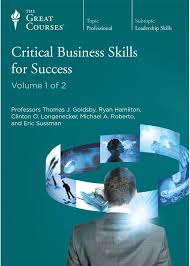Critical Business Skills for Engineering and Innovation
Authored by: IAS Research Team
Published by: IAS Research (ias-research.com)
Abstract:
In today's rapidly evolving engineering and innovation landscape, technical expertise alone is no longer enough for success. Alongside technical prowess, engineers need to be well-equipped with critical business skills to navigate complex projects, lead effectively, and contribute meaningfully to the innovation process. This white paper explores the key business skills essential for engineers in today's world, drawing upon insights from various professors and industry leaders.
Introduction:
The field of engineering is undergoing a significant transformation. Emerging technologies, globalization, and shifting market demands require engineers to be adaptable and possess a broader skillset beyond technical knowledge. Critical business skills empower engineers to navigate these complexities, lead innovative projects, and contribute strategically to organizational goals. This white paper identifies and discusses several key business skills that are increasingly valuable for engineers in the engineering and innovation sector.
Critical Business Skills for Engineers:
- Leadership: Leading and motivating teams is crucial for the successful execution of engineering projects. Engineers need to cultivate strong leadership skills, fostering collaboration, inspiring confidence, and delegating tasks effectively.
- Communication: Clear and concise communication is vital in engineering. Engineers need to be able to communicate complex technical concepts to a diverse audience, including colleagues from non-technical backgrounds, clients, and stakeholders. Strong writing and presentation skills are also essential for communicating ideas and project details efficiently.
- Project Management: Engineering projects often involve managing complex timelines, budgets, and resources. Strong project management skills enable engineers to plan effectively, monitor progress, mitigate risks, and adapt to unforeseen circumstances.
- Problem-Solving and Critical Thinking: Engineering is all about tackling challenges and finding creative solutions. Critical thinking and problem-solving skills are essential for engineers to analyze problems, identify root causes, and develop innovative solutions that meet project objectives.
- Strategic Thinking: Engineers need to understand the bigger picture and connect their technical expertise to broader organizational strategies. Strategic thinking enables them to anticipate future trends, identify opportunities, and align their work with the overall business goals.
- Negotiation and Collaboration: Effective collaboration is key to successful innovation. Engineers need to be able to work collaboratively with teams that include individuals from diverse backgrounds, negotiate solutions, and manage different perspectives to achieve a common goal.
- Innovation and Creativity: The field of engineering thrives on innovation. Engineers need to be creative thinkers, pushing boundaries and exploring new concepts to develop solutions that drive progress.
Conclusion:
By developing a strong foundation in critical business skills, engineers can elevate their contributions in the engineering and innovation space. Mastering these skills allows engineers to take on leadership roles, drive innovation, manage projects effectively, and contribute strategically to achieving organizational objectives. Investing in the development of critical business skills will empower engineers to excel in their careers and become key drivers of progress in a dynamic and ever-evolving world.
Reference List:
- "Critical Business Skills for Success - Professors Thomas J. Goldsby, Ryan Hamilton,Clinton O. Longenecker, Michael A. Roberto,and Eric Sussman
- Additional relevant references on business skills for engineers can be found at:
- National Society of Professional Engineers (NSPE). "Business Practices for Engineers." https://www.nspe.org/membership/nspe-who-we-are-and-what-we-do
- Source 2: e.g., American Society for Engineering Education (ASEE). "21st Century Engineering Skills." (https://www.asee.org/)
Website:
This white paper is published by IAS Research (ias-research.com), a leading organization dedicated to advancing engineering and innovation.
Disclaimer:
The information contained in this white paper is for informational purposes only and does not constitute professional advice. Contact ias-research.com for details.



